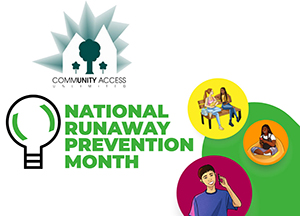
This November, Help Shine a light on the 4.2 million young people who experience some form of homelessness each year.
For Manijah Sherin, the trials of being a teenager were harder being a new mother and having a “rocky” relationship with her own mother.
“I had to leave and I really had nowhere to go,” Sherin said, so she started staying with a friend.
Manijah was referred to Community Access Unlimited when she was 18 and decided to take a chance on the youth program. Now 21, she is pursuing a nursing degree and working as a medical assistant, and she has her own apartment and car.
She credits the support and life skills training she received at CAU with helping her get on her feet and plan for her future. She had a safe place to stay and was able to get a part-time job, finish high school and enroll in college while a member of the Transitional Living Program. CAU offers comprehensive programming for youth at risk in addition to operating the Union County Youth Shelter and providing services for individuals with developmental disabilities.
“The program really helped me be successful and independent,” she said. “They help you with a lot of things that they should teach you in high school but they don’t.”
November is Runaway Prevention Month, a campaign designed to “shine a light” on the experiences of runaway and homeless youth that too often remain invisible, and to share resources that are available.
Runaway and homeless youth face significant risks: they report having higher substance misuse problems, mental health problems, and a high risk of being physically assaulted, according to the Voices of Youth Count from Chapin Hall at the University of Chicago. The count found that 33 percent of homeless youth had once been part of the foster care system. The lack of a high school diploma or General Equivalency Diploma (GED) was the number one correlate for elevated risk of youth homelessness.
Community Access Unlimited and other youth providers help these young people from missing opportunities to build a secure adulthood.
“I benefited so much from the program and it helped me grow into independence as well,” CAU member Cynthia Ortiz-Figueroa said. “They teach you a lot about credit scores, budgeting, housing- they teach you a lot of that.”
Ortiz-Figueroa entered the program at 14 after leaving home and is now 20. She said that staff helped her with important tasks such as finding a job, getting a government ID, registering to vote and writing her resume. She is also receiving help to find an apartment when she leaves the program at 21.
One in ten young adults ages 18-25, and at least one in 30 adolescents ages 13-17, experience some form of homelessness unaccompanied by a parent or guardian over the course of a year, according to the Voices of Youth Count.
Youth who enter the Union County Youth Shelter go through a screening process to determine their needs, and CAU works with families and/or the Department of Children and Families to determine what services the youth might need, such as mental health care, vocational training, or family counseling.
“We have never discharged a youth to the street or back to being homeless,” said Marie Guillaume, director of youth services.

CAU TOP member Terrell Hammons prepares food for Meals on Wheels.
CAU youth programs include the Transitional Opportunities Program (TOP) which provides comprehensive residential services to youth ages 13 to 21, as well as the Union County Youth Shelter and federal Runaway and Homeless Youth Basic Center Program and federal Transitional Living Programs. Over 90 youth participate in college and employment preparation through the Pathways to Academic and Career Exploration to Success (PACES) program, which is part of TOP. CAU also assists youth with costs that can be barriers to employment, such as child care, and runs a College Access Program to individually guide youth and adults through the college admissions process.
Guillaume emphasized the need for transitional programs and recommended that government grants expand the age range for these programs to serve people up to age 24 or 25 who still need assistance establishing independence.
Sherin said she is grateful to have found the support she needed in her life, and that she is inspired to help others in her own career. She is preparing to welcome a second daughter in December and is working toward her goal of becoming a labor and delivery nurse.
“I like babies and I want to leave a mark on this road before I leave, just to know that I helped a family out just like how they helped me out,” she said.
Eligible youth can become a Community Access Unlimited TOP member by referral through the New Jersey Division of Child Protection and Permanency, Children’s System of Care, referral by local schools, community organizations or local agencies, faith-based organizations, hospitals and medical offices, self-referral, or by anyone encountering a youth seeking shelter or assistance. Contact CAU to ask about eligibility for other youth programs.
